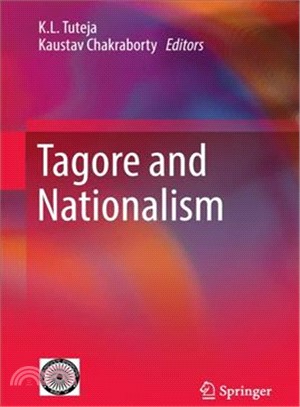Tagore and nationalism
正題名/作者 : Tagore and nationalism/ edited by K. L. Tuteja, Kaustav Chakraborty.
其他作者 : Tuteja, K. L.
出版者 : New Delhi :Springer India :2017.
面頁冊數 : xiv, 379 p. :ill., digital ;24 cm.
Contained By : Springer eBooks
電子資源 : 線上閱讀(Springer)
ISBN : 9788132236962 (ebook)
ISBN : 9788132236955 (paper)
LEADER 02323cmm 2200205 a 450
001 266248
008 170315s2017 ii s 0 eng d
020 $a9788132236962 (ebook)
020 $a9788132236955 (paper)
035 $a00313206
041 0 $aeng
050 4$aPK1727.N36$bT34 2017
082 04$a891.44$223
090 $aE-BOOK/891.44///UE016800
245 00$aTagore and nationalism$h[electronic resource] /$cedited by K. L. Tuteja, Kaustav Chakraborty.
260 $aNew Delhi :$bSpringer India :$bImprint: Springer,$c2017.
300 $axiv, 379 p. :$bill., digital ;$c24 cm.
520 $aThis volume brings together eminent Tagore scholars and younger writers to revisit the concepts of nation, nationalism, identity and selfhood, civilization, culture and homeland in Tagore's writings. As these ideas take up the centre-stage of politics in the subcontinent as also elsewhere in the world in the 21st century, it becomes extremely relevant to revisit his works in this context. Tagore's ambivalence towards nationalism as an ideology was apparent in the responses in his discussions with Indians and non-Indians alike. Tagore developed the concept of 'syncretic' civilization as a basis of nationalist civilizational unity, where society was central, unlike the European model of state-centric civilization. However, as the subterranean tensions of communalism became clear in the early 20th century, Tagore reflexively critiqued his own political position in society. He thus emerged as the critic of the nation/nation-state and in this he shared his deep unease with other thinkers like Romain Rolland and Albert Einstein. This volume for the first time covers the socio-political, historical, literary and cultural concerns relating to Tagore's efforts towards the 'de-colonization' of the Self. The volume begins with various perspectives on Tagore's 'ambivalence' about nationalism. It encompasses critical examinations of Tagore's literary works and other art forms as well as adaptations of his works on film. It also reads Tagore's nationalism in a comparative mode with contemporary thinkers in India and abroad who were engaged in similar debates.
600 10$aTagore, Rabindranath,$d1861-1941$xCriticism and interpretation.$3471776
650 0$aBengali literature.$3471779
650 0$aNationalism in literature.$3243316
650 0$aNationalism$zIndia.$3246819
650 14$aCultural and Media Studies.$3404926
650 24$aAsian Culture.$3419366
650 24$aPostcolonial/World Literature.$3408901
650 24$aHistory of South Asia.$3408405
700 1 $aTuteja, K. L.$3471777
700 1 $aChakraborty, Kaustav.$3471778
710 2 $aSpringerLink (Online service)$3374217
773 0 $tSpringer eBooks
856 40$uhttps://erm.library.ntpu.edu.tw/login?url=http://dx.doi.org/10.1007/978-81-322-3696-2$z線上閱讀(Springer)
950 $aLiterature, Cultural and Media Studies (Springer-41173)
This volume brings together eminent Tagore scholars and younger writers to revisit the concepts of nation, nationalism, identity and selfhood, civilization, culture and homeland in Tagore's writings. As these ideas take up the centre-stage of politics in the subcontinent as also elsewhere in the world in the 21st century, it becomes extremely relevant to revisit his works in this context. Tagore's ambivalence towards nationalism as an ideology was apparent in the responses in his discussions with Indians and non-Indians alike. Tagore developed the concept of 'syncretic' civilization as a basis of nationalist civilizational unity, where society was central, unlike the European model of state-centric civilization. However, as the subterranean tensions of communalism became clear in the early 20th century, Tagore reflexively critiqued his own political position in society. He thus emerged as the critic of the nation/nation-state and in this he shared his deep unease with other thinkers like Romain Rolland and Albert Einstein. This volume for the first time covers the socio-political, historical, literary and cultural concerns relating to Tagore's efforts towards the 'de-colonization' of the Self. The volume begins with various perspectives on Tagore's 'ambivalence' about nationalism. It encompasses critical examinations of Tagore's literary works and other art forms as well as adaptations of his works on film. It also reads Tagore's nationalism in a comparative mode with contemporary thinkers in India and abroad who were engaged in similar debates.
ISBN: 9788132236962 (ebook)Subjects--Personal Names:
471776
Tagore, Rabindranath,
1861-1941--Criticism and interpretation.Subjects--Topical Terms:
471779
Bengali literature.
LC Class. No.: PK1727.N36 / T34 2017
Dewey Class. No.: 891.44
- 館藏(1)
- 心得(0)
- 標籤
- 相同喜好的讀者(0)
- 相關資料(0)

